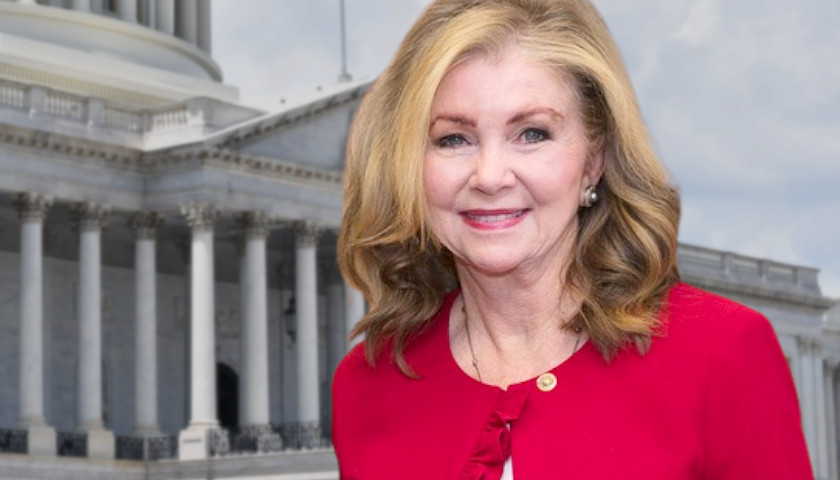Having received an appointment to the U.S. Senate Finance Committee this week, Senator Marsha Blackburn (R-TN) is poised to play a major role in this year’s fight over raising the debt ceiling.
Earlier this week, Blackburn joined her Utah Republican colleague Mike Lee in penning a letter, signed by 22 of their fellow senators, insisting a rise in the federal debt limit must only happen as part of a deal to pare back government spending.
In an interview with The Tennessee Star, Blackburn explained her view that fiscal circumstances demand such an agreement so debt does not snowball into an even more unmanageable burden on American families.
“The federal government has an insatiable appetite for taxpayers’ money,” she said. “And if you send it to the federal government, they will spend every penny of it, plus they’re going to run up debt. So I come to this saying we owe it to our kids and our grandkids to make certain that we get this federal spending under control.”
America’s general-fund debt has reached $31 trillion, an amount greater than the nation’s economic output. Government’s repeated decision to spend in excess of the revenues it receives has intensified inflation, raising prices on consumer goods. According to an analysis by Congress’s Joint Economic Committee, inflation in late 2022 cost the average Tennessee family $629 more per month over its expenses in the prior year.
Blackburn faults President Joe Biden above all for edging America toward its financial precipice. During Biden’s two years in office so far, federal spending has increased by almost $10 trillion; debt has grown by more than $4.8 trillion. The senator particularly faulted the chief executive for budgeting $80 billion for more Internal Revenue Service (IRS) personnel and $400 billion for environmental expenditures that she said conform to the Green New Deal, a socialist environmental cause célèbre.
“These are examples of our money being used for programs that we do not want and programs that our kids are going to be paying for and for decades to come,” she lamented.
Throughout her years as a legislator, Blackburn has authored legislation to make across-the-board non-defense discretionary spending cuts of between one and five percent of the budget.
“Everybody can save a penny or a nickel out of a dollar and the federal government should have to do that also,” she said.
Blackburn said an upcoming deal to raise the debt limit must include structural reform that holds down overall expenditures while keeping military spending robust and preserving entitlement programs for senior citizens. She is urging fellow lawmakers and the White House to consider backing the Full Faith and Credit Act, of which she is a cosponsor, to achieve such change. She also wants policymakers to consider federal salary and hiring freezes.
Republican success in these efforts will depend significantly on the steadfastness of the House of Representatives which, unlike the Senate, is controlled by Republicans. House Speaker Kevin McCarthy (R-CA-20) is strongly pressing the White House for concessions in the form of spending cuts. While President Joe Biden has characterized a hike in the debt ceiling as nonnegotiable, McCarthy voiced cautious optimism that House Republicans, Biden and Senate Democrats can reach a deal to attach a money-saving rider to a debt-limit increase.
The speaker ascribed that feeling to an hour-long exchange he had with the president at the White House on Wednesday.
“We both have different perspectives on this but I thought this was a good meeting,” he said. “We promised we would continue the conversation and we’ll see if we can get there. I think, at the end of the day, we can find common ground; I really do.”
Blackburn’s own assessment is also hopeful. She recalled she was able to work a two-percent spending-cut into the Budget Control Act in 2011 which ended a spending-policy impasse and she believes similar coalescence is possible now.
“Just as we went through that process and the Democrats had to come to the table and had to give up their spending, I think you will see them come back to the table again,” she said.
The senator added she hopes to impact a number of areas of fiscal policy beyond the debt ceiling in her capacity as a Finance Committee member. On Thursday, she joined Senator Mike Braun (R-IN) in introducing the IRS User Fee Reduction Act which would direct the taxing agency to lower its user fees for businesses earning less than $2.5 million by 95 percent.
She said she also wants to focus on making the 2017 federal tax cuts permanent and on effecting trade policy favorable to domestic manufacturers. She encouraged constituents to go onto her website and subscribe to The Blackburn Report to stay apprised of these efforts.
– – –
Bradley Vasoli is a reporter at The Tennessee Star. Follow Brad on Twitter at @BVasoli. Email tips to [email protected].
Photo “Marsha Blackburn” by Marsha Blackburn.









Yea for Marsha Blackburn!